Written by military commando and International Aid Worker Mark ‘Squiz’ Squirrell OAM.
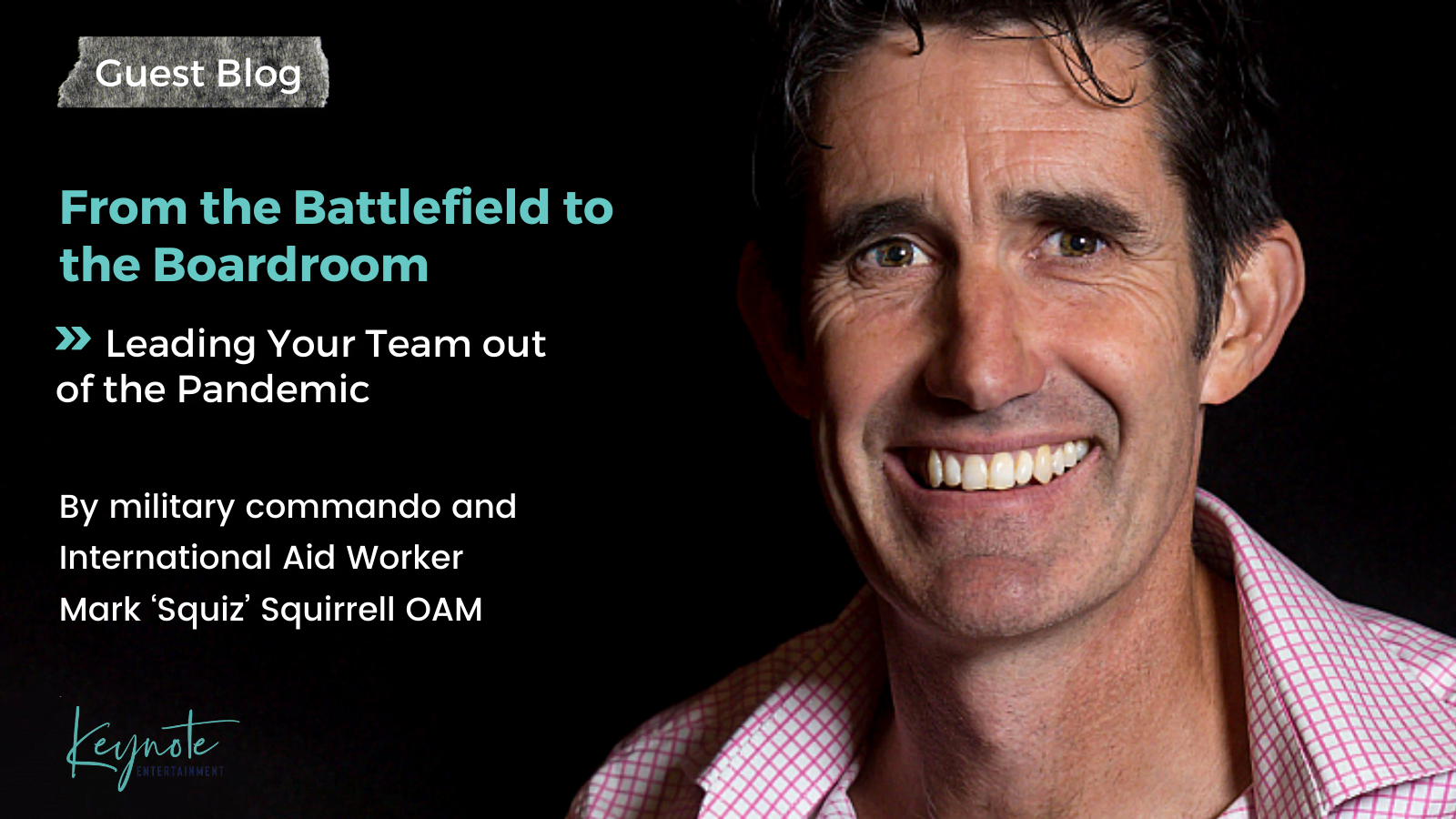
Leading on the Battlefield
The windscreen of the lead vehicle in our three-car convoy is shattered by a bullet. The four-inch armoured glass has done its job; the bullet did not penetrate the vehicle.
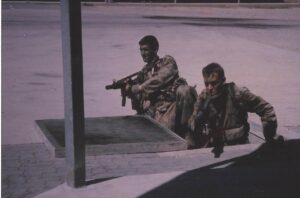 We are in the Gaza Strip and stuck at the last intersection before we can travel the final kilometre to the Israeli border. Two Israeli Defence Force (IDF) tanks with barrels pointing directly at our vehicle are thirty metres to our front. Behind, we have an agitated Palestinian crowd that is preventing us from doing a U-turn.
We are in the Gaza Strip and stuck at the last intersection before we can travel the final kilometre to the Israeli border. Two Israeli Defence Force (IDF) tanks with barrels pointing directly at our vehicle are thirty metres to our front. Behind, we have an agitated Palestinian crowd that is preventing us from doing a U-turn.
The lead vehicle is allowed to move slowly past the tanks, but the Tank Commander clearly indicates through hand signals that my vehicle, and the third vehicle in our convoy, are to remain. Over the next hour I phone the IDF military liaison officer multiple times to request passage through the intersection. He is on board as we are a convoy of diplomats and aid workers with the right to move freely. The problem is, it’s taking a long time for his message to go up through the chain of command and then back down to the Tank Commander. We need leadership that is decisive, outside the box and relevant to our situation right now.
____________
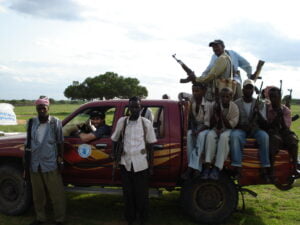 For 20 years I’ve worked as a Security Risk Manager to assist with the delivery of aid to desperate communities in war-ravaged countries such as Somalia, Afghanistan and Pakistan. The risks of kidnap, crossfire and landmines were just a few of the likely threats, exacerbated by linguistic limitations, cultural restrictions and dilapidated infrastructure. In an environment like that, trust, teamwork and leadership meant the difference between success and failure.
For 20 years I’ve worked as a Security Risk Manager to assist with the delivery of aid to desperate communities in war-ravaged countries such as Somalia, Afghanistan and Pakistan. The risks of kidnap, crossfire and landmines were just a few of the likely threats, exacerbated by linguistic limitations, cultural restrictions and dilapidated infrastructure. In an environment like that, trust, teamwork and leadership meant the difference between success and failure.
I often wondered, whilst attempting to navigate through unmapped parts of South Sudan or negotiating with Tamil Tigers in Sri Lanka through a translator, how much easier it would be to lead teams during an emergency setting if it was back in Australia. The Covid-19 outbreak gave me the opportunity to find out.
Leading During the Pandemic
During the COVID emergency our training room was converted to an Operations Centre, and over an 18-month period we were at the forefront of Australia’s response to the outbreak, managing teams of nurses and logisticians.
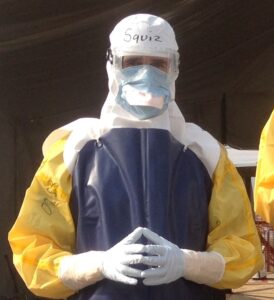 Although I had worked within a similar emergency during the 2014 Ebola Outbreak in West Africa, there was still a level of anxiety and caution for the rapidly unfolding circumstances.
Although I had worked within a similar emergency during the 2014 Ebola Outbreak in West Africa, there was still a level of anxiety and caution for the rapidly unfolding circumstances.
The COVID projects were time-critical and complex, similar to when I was delivering humanitarian aid overseas. The difference was that we now had at our disposal the latest technology, sealed and uncluttered roads and teams all hailing from the same culture. Unexpectedly though, I found myself embroiled with team dilemmas, inefficiencies and communication challenges similar to those I’d experienced working abroad.
While there were no concerns of kidnap or aerial bombardment and no translation issues, I witnessed the same levels of stress in my teams as when deployed overseas. Why? Because we were able to take on a greater workload and set bigger goals than we would have overseas. The opportunity for stress, team fracturing and things to go wrong was absolutely present, and the best way to mitigate that was to build the team dynamics, monitor and tweak the culture and, most importantly, provide decisive leadership.
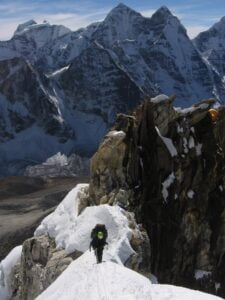 Prior to the pandemic my company provided keynotes, workshops and team building activities to strengthen workplace performance. Right now my own teams needed this more than anyone. I took them on a metaphorical journey up Mt Everest to learn about teamwork, and used Virtual Reality goggles to strap them into the front seat of the Gaza Scenario that you are halfway through. The experiences allowed for robust conversation, a calibration of thoughts about our own operational issues and most importantly, a distraction from the intense daily pressure. It worked.
Prior to the pandemic my company provided keynotes, workshops and team building activities to strengthen workplace performance. Right now my own teams needed this more than anyone. I took them on a metaphorical journey up Mt Everest to learn about teamwork, and used Virtual Reality goggles to strap them into the front seat of the Gaza Scenario that you are halfway through. The experiences allowed for robust conversation, a calibration of thoughts about our own operational issues and most importantly, a distraction from the intense daily pressure. It worked.
Leading Out of the Pandemic
As the Pandemic unfolded there was one aspect of the change to workplaces, regardless of the industry, that made it easy on those making the leadership decisions. The changes were forced upon us by the Government. So what do we do now that those regulations are being wound back?
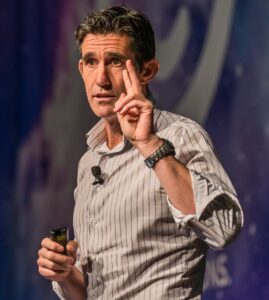 As we begin moving to post-pandemic life, organisations need leadership that is decisive, outside the box and relevant to their current situation. Sound familiar? I learnt very quickly whilst ‘sandwiched’ in the Gaza Strip that the standard operating procedure that worked fine in yesterday’s circumstances was not going to resolve our current problem.
As we begin moving to post-pandemic life, organisations need leadership that is decisive, outside the box and relevant to their current situation. Sound familiar? I learnt very quickly whilst ‘sandwiched’ in the Gaza Strip that the standard operating procedure that worked fine in yesterday’s circumstances was not going to resolve our current problem.
Leaders will now need to:
– Take a long-term approach and not expect team members to suddenly revert back to pre-pandemic operations;
– Acknowledge that there may be some efficiencies and mental health/morale benefits for team members working from home;
– Create other stimulus to entice team members into the office, such as entertainment or team bonding events;
– Create contemporary oversight structures to compliment the newfound autonomy;
– Use external consultants to objectively arrive at suitable frameworks to take the heat away from what will be seen as an imposition by management to team members.
____________
Leading Out of the Gaza Strip
We were cornered! Two tanks were blocking forward movement and a marauding crowd was building up behind. Similar situations in the past were mitigated by obtaining clearance from the military liaison officer. But that wasn’t working today.
So, if you were there, what would you do next?
We could wave a white flag, but that won’t have any tangible impact on the current circumstances given that those around us already know who and what we represent. We could attempt to reverse and move back through the crowd, hoping that they show some mercy. Unlikely, they have already seen one of our cars get past the blockade and aren’t too happy about that. Plus, hope is not a good strategy when things are going wrong.
I’ll give you a chance to make a phone call. Who would it be to?
The phone call is a decisive leadership decision, but you can’t call the Tank Commander as you don’t have their number. You can call your boss, Ambassadors, Israeli or Palestinian officials but it will still take a long time for the message to get down to those on the ground. So, who will you call?
If you thought that the best option would be to call the lead vehicle; you nailed it! The vehicle has now travelled the one kilometre to the Israeli border and is currently parked alongside IDF soldiers that have a direct line with the Tank Commander. We ask our lead vehicle to use the hole in their windscreen as leverage, threatening to take it to the media if they don’t get the remaining two cars out of the blockade. Within 30 seconds of making the phone call, warning shots are fired into the ground in front of us by the Tank Commander, the crowd pushes back and we’re given the hand signal to move through the intersection. Well done, you have led your team through this difficult situation.
The question for you now is this: What are you doing as a leader that’s decisive, outside the box and relevant to the new normal?
____________________
Want to hear more?
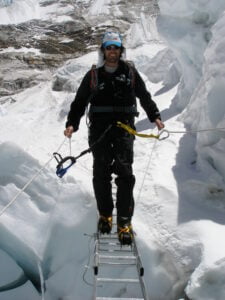 Awarded the coveted green beret during his military service and recognised with an Order of Australia Medal (OAM) for his international humanitarian aid work, Mark Squirrell is one of our most courageous and well-respected motivational speakers. Squiz’s presentations include a thrilling recount of his awe-inspiring journey from the world’s most brutal war zones to the summit of Mt Everest, brought to life by the use of authentic footage and Virtual Reality goggles for a truly unforgettable experience. If you’d like Squiz to share his knowledge about leadership, teamwork and communication with your team, get in touch with us for a chat.
Awarded the coveted green beret during his military service and recognised with an Order of Australia Medal (OAM) for his international humanitarian aid work, Mark Squirrell is one of our most courageous and well-respected motivational speakers. Squiz’s presentations include a thrilling recount of his awe-inspiring journey from the world’s most brutal war zones to the summit of Mt Everest, brought to life by the use of authentic footage and Virtual Reality goggles for a truly unforgettable experience. If you’d like Squiz to share his knowledge about leadership, teamwork and communication with your team, get in touch with us for a chat.
